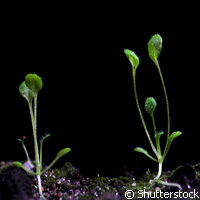Scientists piece together epigenetic memory puzzle
A new British study sheds light on how an organism has the capacity to create a biological memory of a variable factor like temperature or nutrition. Presented in the journal Nature, the findings provide insight on the mechanism of this memory, what experts call a kind of 'biological switch', and how offspring can inherit it. Carried out by John Innes Centre (JIC) researchers, the study was funded in part by the ENVGENE ('Dissection of environmentally mediated epigenetic silencing') project, which received an Advanced Investigator European Research Council (ERC) grant worth EUR 2.45 million under the EU's Seventh Framework Programme (FP7). 'There are quite a few examples that we now know of where the activity of genes can be affected in the long term by environmental factors,' explains senior author Professor Martin Howard from the Department of Computational and Systems Biology at the JIC. 'And in some cases, the environment of an individual can actually affect the biology of physiology of their offspring but there is no change to the genome sequence.' Past studies indicated that the children and grandchildren of families whose grandparents' generation dealt with a severe shortage of food have a higher chance of being diagnosed with cardiovascular disease and diabetes; epigenetic memory could potentially explain this. The piece that was missing from this puzzle, however, was an explanation of how individuals could develop a 'memory' of a variable condition. This is where the JIC study comes in, co-headed by Professor Howard and Professor Caroline Dean from the Department of Cell and Developmental Biology. The JIC team drew upon a plant's ability to 'remember' the length of the cold winter season in order to kick-start the flowering process, so that pollination, development, seed dispersal and germination occur when they should. 'We already knew quite a lot about the genes involved in flowering,' says Professor Howard, 'and it was clear that something goes on in winter that affects the timing of flowering, according to the length of the cold period.' The researchers used a combination of mathematical modelling and experimental analysis to reveal the system by which an important gene, called FLC, is switched either completely off or completely on in any cell and in its offspring. According to the team, more cells will have FLC steadily flipped to the off position the longer the cold period is, leading to a delay in the flowering process. The researchers say this phenomenon is called epigenetic memory. While epigenetic memory varies in appearance, experts say one key form involves histones, which are proteins around which deoxyribonucleic acid (DNA) can wind. Histones can carry specific chemical modifications, which in turn can impact the expression of nearby genes, flipping them on or off. Daughter cells can inherit these modifications, as can the offspring of cells that form gametes (mature sexual reproductive cells). Thanks to their model, it was possible to predict that within each cell, the FLC gene should be either fully on or off, with the fraction of cells switching to the off state in longer cold periods. Co-author Dr Jie Song, a member of Professor Dean's group, found that the histone proteins near the FLC gene were modified during the cold period, thus accounting for the switching off of the gene. Commenting on the results of the study, Professor Douglas Kell of the Biotechnology and Biological Sciences Research Council (BBSRC), which also partially funded the study, says: 'This work not only gives us insight into a phenomenon that is crucial for future food security - the timing of flowering according to climate variation - but it uncovers an important mechanism that is at play right across biology.'For more information, please visit:John Innes Centre (JIC):http://www.jic.ac.uk/corporate/index.htmNature:http://www.nature.com/
Countries
United Kingdom



